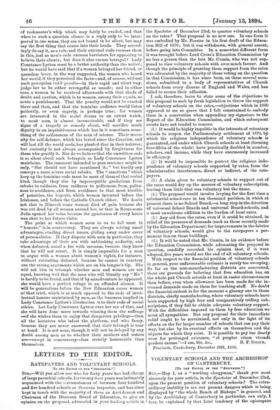LETTERS TO THE EDITOR.
RATEPAYERS AND VOLUNTARY SCHOOLS.
[To Too EDITOR OF THE "SPECTATOR."] SIR,—Will you allow one who for forty years has had charge of large parochial schools, for twenty-four years was intimately acquainted with the circumstances of between four hundred and five hundred schools as diocesan inspector, and has since kept in touch with the majority of them as Archdeacon and Chairman of the Diocesan Board of Education, to give an opinion on the proposal, advocated in your leading article in the Spectator of December 23rd, to quarter voluntary schools on the rates P That proposal is no new one. In one form it was embodied by Mr. Forster in his first draft of the Educa- tion Bill of 1870; but it was withdrawn, with general assent, before going into Committee. In a somewhat different form
it was brought before Lord Cross's Education Commission by no less a person than the late Mr. Cumin, who was not sup- posed to view voluntary schools with over-much favour. .And though the principle of granting them support from the rates. was advocated by the majority of those voting on the question in that Commission, it has since been, on three several occa- sions, submitted to a body of representatives of Church schools from every diocese of England and Wales, and has failed to secure their adhesion.
I ask, therefore, leave to state some of the objections to this proposal to seek by fresh legislation to throw the support of voluntary schools on the rates,—objections which in 1888 appeared to me so grave that I felt constrained to embody them in a reservation when appending my signature to the- Report of the Education Commission, and which subsequent events have not tended to remove.
(1.) It would be highly impolitic in the interests of voluntary schools to reopen the Parliamentary settlement of 1870, by which the religious independence of voluntary schools is guaranteed, and under which Church schools at least (forming four-fifths of the whole) have practically doubled in number, scholars, and income, while they have enormously increased' in efficiency.
(2.) It would be impossible to protect the religious inde- pendence of voluntary schools supported by rates, from the administrative interference, direct or indirect, of the rate- payers.
(3.) A claim given to voluntary schools to support out of the rates would dry up the sources of voluntary subscription, leaving them little that was voluntary but the name.
(4.) The proposal would involve levying for the first time a substantial school-rate in ten thousand parishes, in which at present there is no School Board,—a long step in the direction of universal School Boards and universal Board-schools, and a most unwelcome addition to the burden of local rates.
(5.) Any aid from the rates, even if it could be obtained, in relief of the pressure of demands (such as those recently made by the Education Department) for improvements in the fabrics of voluntary schools, would give to the ratepayers a per- manent lien on these buildings.
(6.) It will be noted that Mr. Cumin, in his evidence before- the Education Commission, while advocating the proposal in question, candidly recorded his opinion that, if it were adopted, five years would see the end of all voluntary schools.
With respect to the financial position of voluntary schools- in general, your unfavourable estimate is surely too sweeping._ So far as the non-manufacturing districts are concerned,, there are grounds for believing that free education has, on the whole, put Church schools at least in easier circumstances than before, even when allowance has been made for the in-. creased demands made on them for teaching-staff. No doubt the financial outlook is for the moment a gloomy one in those districts, chiefly manufacturing, where voluntary schools have- been supported by high fees and comparatively trifling sub- scriptions, if they fail to obtain adequate voluntary support.
With the difficulties imposed on them by free education we must all sympathise. But any proposal for their immediate- relief ought to be scrutinised, not only in the light of Re effects on the far larger number of schools that can pay their way, but also by its eventual effects on themselves and the objects for which they exist. It is possible to pay too dearly even for prolonged existence, "et propter vitam vivendi






































 Previous page
Previous page